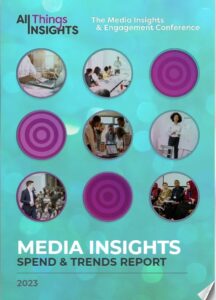Focusing on the Value of Insights
Of course, proving or showcasing insights impact presents its own set of challenges and opportunities. This can often depend on the team environment, leadership styles, even the size of the budget and investments made. The objectives and variables, whether short or long term, also play a role in the eventual impact. Even the types of metrics and measurements used might factor into the influence of insights in the end analysis.
Having a singular research focus is key, as is making sure that everything is focused on the business. Linking everything to business impact is significant, as noted by Ipsos in its research report, “Value of Insights: Moving to Impact.” Ipsos further notes that this drive for the business should also be augmented by consumer understanding, as well as nurturing a consumer-centric culture. Ipsos reveals its top rules to help create that business impact:
1. Clearly define the business decisions that your company will take using the research. Invest in a new product line, cut costs or define a new brand positioning and identify the current pain points related to the business issue.
2. Build the research plan around the marketing strategy: your company’s annual plans, its objectives and targets. Make sure you share those with your research agency.
3. Design your research based on the decisions taken by the “end consumers”. Think about how consumers approach the need and then design following this logic: e.g., rather than a “standard tracking”, an approach based on consumption occasions may be more appropriate.
4. Before any analysis or presentation, a fresh detailed brief on the current consumer challenges and brand situation is needed and must be agreed with the internal research stakeholder.
5. Connecting the dots between your different sources of insight and data will help develop a consistent marketing approach. Any piece of research must be linked with other pieces of research and data available.
6. Do not limit your research answers to the direct results. Go further and look for actionability, for the so what and now what: tackle the pain points identified and answer them in the end-user language.
7. Ensure decisions are taken (or confirmed) using fresh data and insights.
8. At the budgeting stage, ask the question: ‘what would you do if you could not get the budget for conducting this new research?’.
9. Before launching any additional study, think about the newness of insight you want to get. One of our clients has decided that they will invest in new research only when there is a clear objective in terms of expected fresh insight.
10. Always follow up after action has been taken: did we achieve the expected business outcome? Document and communicate broadly how research has had an impact.
Making the Case for Insights
In “Making an Insights Impact in a Year of Uncertainty,” All Things Insights’ Seth Adler caught up with Natasha Hritzuk, VP Consumer Insights, Warner Bros. Discovery. Hritzuk, who participated in a panel on leadership and influence during TMRE @ Home, chats with Adler about the influence of insights, the impact of the function, and doing less with more.
Looking forward to TMRE 2024? The conference, which will be held October 8 to 10, will feature the session, “Fireside Chat: Driving Impact in a Disrupted World,” presented by Thomas Walker, VP Global Consumer Insights, eBay, and Jim Whaley, CEO, OvationMR. In a world where consumer insights teams are facing challenges due to technology and the macroeconomy, we need to think smarter about how to drive impact vs. activity to remain a trusted, relevant partner to our stakeholders. This session will dive into how insights professionals must be laser focused on driving outcomes over activity, ruthlessly prioritize and align our work to the most important business objectives; and leverage AI to enable customer-centricity at scale. Register for TMRE 2024 here.
Put the Customer at the Center of the Conversation
Market research and insights professionals can indeed make a significant impact on their corporate enterprise. We asked Google’s Gemini to outline a few of the broader themes:
1. Informing Strategic Decision-Making:
- Identifying Market Opportunities: Through research, they can uncover new customer segments, emerging trends, and unmet needs. This allows businesses to capitalize on new market opportunities and stay ahead of the competition.
- Validating Product Concepts & Ideas: Insights professionals can test and refine product concepts before launch, ensuring they resonate with the target audience. This reduces the risk of failure and wasted resources.
- Optimizing Marketing Strategies: Research helps understand customer preferences and buying behaviors. This knowledge can be used to develop targeted marketing campaigns that are more effective and generate a higher ROI.
2. Fostering Customer Centricity:
- Understanding Customer Needs & Pain Points: Market research puts the customer at the center of the conversation. By understanding their needs, wants, and frustrations, businesses can develop products and services that truly address their problems.
- Improving Customer Experience: Insights can be used to identify areas where the customer experience can be improved. This can lead to increased customer satisfaction, loyalty, and advocacy.
- Building Brand Trust: By demonstrating a commitment to understanding customer needs, market research professionals can help build brand trust and credibility.
3. Driving Innovation:
- Identifying New Product Ideas: Research can spark innovation by uncovering unmet needs and market gaps. This can lead to the development of new and differentiated products and services.
- Optimizing Existing Products: Insights can be used to identify areas where existing products can be improved to better meet customer needs.
- Staying Ahead of the Curve: By tracking industry trends and competitor activity, market research helps businesses stay ahead of the curve and adapt to changing market dynamics.
Insights Inspiring Action
Overall, market research and insights professionals play a critical role in helping businesses make data-driven decisions, build stronger customer relationships, and drive sustainable growth. To maximize their impact, these professionals should strive to be:
- Strong Communicators: They need to effectively translate complex data insights into clear and actionable recommendations for stakeholders across the organization.
- Business Acumen: Understanding the business context and objectives is crucial for framing research questions and presenting insights that are relevant to strategic decision-making.
- Storytellers: By weaving compelling narratives around data, insights professionals can capture the attention of decision-makers and inspire action.
While all these attributes are important, Ipsos points out that it is the consumer-centricity that will truly make the research stand out and make an impact. It all circles back to gauging the voice of the consumer. Ipsos writes, “[There is] a strong opportunity for the consumer insight function to be ‘the voice of the consumer’ and to make the impact of insight at the heart of the mission. But this is not only about traditional consumer insights. There is new space for data insights enhanced with human insights. The ‘democratization’ of data means the voice of the consumer can come from many sources, not all of them coming from the insight team.”
Video courtesy of InSites Consulting
Contributor
-

Matthew Kramer is the Digital Editor for All Things Insights & All Things Innovation. He has over 20 years of experience working in publishing and media companies, on a variety of business-to-business publications, websites and trade shows.
View all posts




















































































































